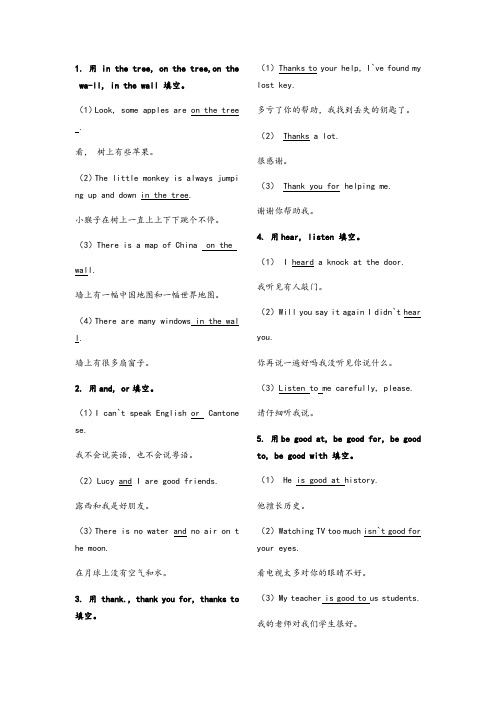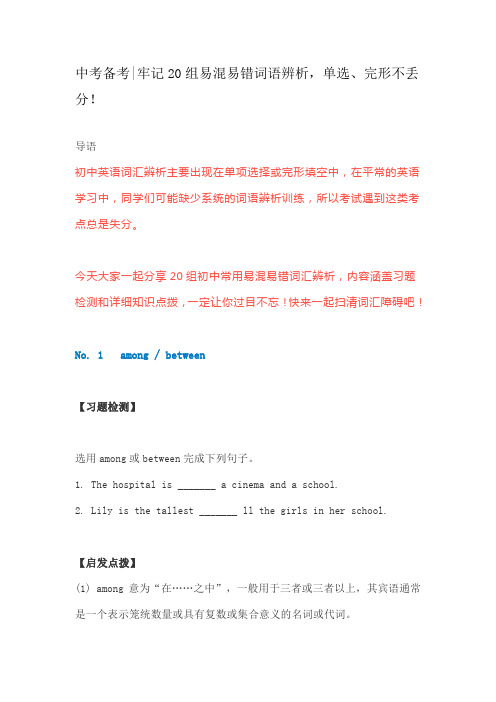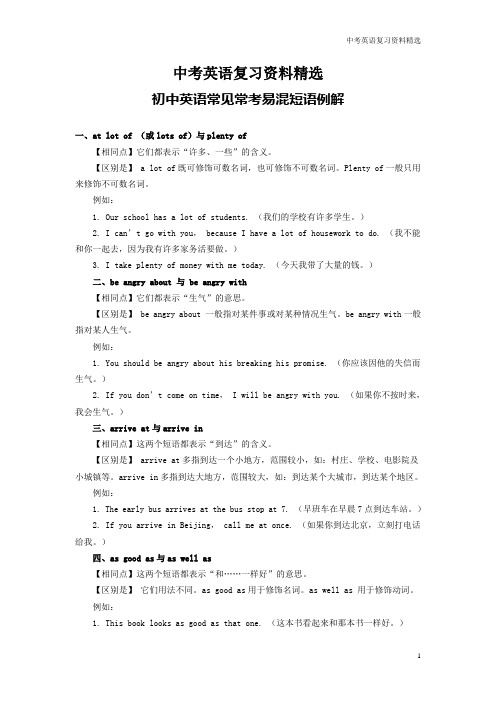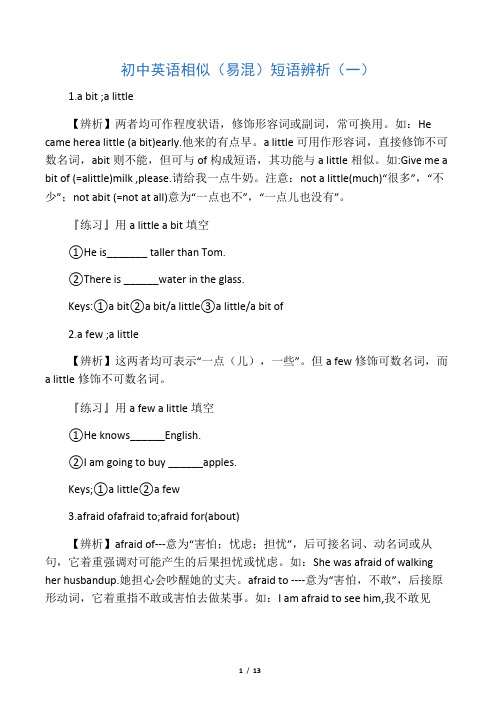初中英语易混词辨析
英语初中常用易混淆单词词组的区别用法

中考初中英语常用易混淆单词词组的区别用法英语常用易混淆单词/词组的区别用法一、how much和how many的区别用法how much和how many的区别:how much用来询问事物的数量,后接不可数名词;how many用来询问事物的数量,后接可数名词复数。
how much和how many的区别1、所修饰词不同how much用来修饰不可数名词,表示数量,也可单独使用。
how many用来修饰可数名词的复数,它的句式是:How many+复数名词+一般疑问句+?例句:How much milk is there in the glass?玻璃杯里有多少牛奶?How many books are there on the desk?有多少本书在桌子上?2、用法不同How much 表示多少钱,用来问价格。
例句:How much is this dress?这个连衣裙多少钱?How many 表示多少,用来问数量。
例句:How many apples do you have?你有多少苹果?二、in和on的区别用法当我们表示某些东西被其他东西所包围时使用“in”这个词。
而“on”用于描述物体被放置在其他物体上方或外部的情况。
in可表时间,表地点,表手段、方法、材料。
on表示时间、地点、方位等。
in和on区别一、意思不同in:prep. 在 ... 里;在 ... 地方;在 ... 期间on:prep. 在 ... 之上二、用法不同in: in着重一段时间的过程,常用于重复动作或延续动作。
in表示从现在时间算起推移到将来的一段时间之后,一般与将来时态连用。
例句:He is a layman in economics.他对经济学一窍不通。
on:表示“在物体的表面上”,只能用on的表达方式有on the next morning,on the following。
例句:The spider is walking on the ceiling.蜘蛛在天花板上爬行。
初中英语易混词、短语辨析

1. 用 in the tree, on the tree,on the wa-ll, in the wall 填空。
(1)Look, some apples are on the tree .看,树上有些苹果。
(2)The little monkey is always jumpi ng up and down in the tree.小猴子在树上一直上上下下跳个不停。
(3)There is a map of China on thewall.墙上有一幅中国地图和一幅世界地图。
(4)There are many windows in the wal l.墙上有很多扇窗子。
2. 用and, or填空。
(1)I can`t speak English or Cantone se.我不会说英语,也不会说粤语。
(2)Lucy and I are good friends.露西和我是好朋友。
(3)There is no water and no air on t he moon.在月球上没有空气和水。
3. 用 thank., thank you for, thanks to 填空。
(1)Thanks to your help, I`ve found my lost key.多亏了你的帮助,我找到丢失的钥匙了。
(2) Thanks a lot.很感谢。
(3) Thank you for helping me.谢谢你帮助我。
4. 用hear, listen 填空。
(1) I heard a knock at the door.我听见有人敲门。
(2)Will you say it again I didn`t hearyou.你再说一遍好吗我没听见你说什么。
(3)Listen to me carefully, please.请仔细听我说。
5. 用be good at, be good for, be good to, be good with 填空。
初中英语易混淆单词及短语简析

p se g r・ a sn es
A. o wih g t C.p a t ly wih
B.h l t ep wih D. a t de lwi h
A.p c p ik u
B.ma e u k p
C. e p g tu
D.s n p edu
“ 助某 人 ” 帮 之义 ;el i d a wt h是 “ 处理 , 付 , 对
涉及 ” 的含义 。
3 一 Mo . m,c n I a
— —
ቤተ መጻሕፍቲ ባይዱ
射, 使上 升 ” 的含义 。
t he TV?1wa tt n o
7 一 W h r r c o l lt e . o y u . e e a e my s h o oh s d o c
思。
6 .~ W h tr l o we h v n te hih y a u e d a e o h g wa ?
一
Bu o tt n h y tId n’ hi k te
c a! ot
h s n w i e
Bu e o c r a e s s r a s r no al we o t l o d t
【 解析 】 正确 的选择应 该是 A。owt g i h在这
儿是 “ … …相 配 , 跟 与… …相 伴” 的意思 ;l pa y wt i h的 意思 是 “ 玩弄 ,戏 耍 ”h l i :epwt h是
【 析 】A 为正 确 答 案 ,有 “ 车 接 载 解 用
( )拿 起 , 起 , 加 ( 人 , 捡 增 速度 ) 的 意思 ; a e ” m k u p有 “ 造 , 成 , 构 , 妆 ” 含 义 ;e 编 组 虚 化 的 gt u p有 “ 床 . 来 ” 意 思 : n p有 “ 起 起 的 s du e 发
英语中考牢记20组易混易错词语辨析

中考备考|牢记20组易混易错词语辨析,单选、完形不丢分!导语初中英语词汇辨析主要出现在单项选择或完形填空中,在平常的英语学习中,同学们可能缺少系统的词语辨析训练,所以考试遇到这类考点总是失分。
今天大家一起分享20组初中常用易混易错词汇辨析,内容涵盖习题检测和详细知识点拨,一定让你过目不忘!快来一起扫清词汇障碍吧!No. 1 among / between【习题检测】选用among或between完成下列句子。
1. The hospital is _______ a cinema and a school.2. Lily is the tallest _______ ll the girls in her school.【启发点拨】(1) among意为“在……之中”,一般用于三者或三者以上,其宾语通常是一个表示笼统数量或具有复数或集合意义的名词或代词。
(2) between一般指两者之间,其宾语通常是表示两者概念的名词或代词,或由and连接的两个具体的人或物。
between有时也可表示多者之中的“两两之间”。
如:Switzerland lies between France, Germany, Austria and Italy.Key:1. between2. amongNo. 2 lay / lie【习题检测】用lay或lie的适当形式完成句子。
1. I _______ the table when my mother cooked the meal.2. John was ill and _______ in bed all morning.【启发点拨】(1) lay作动词,可意为“摆放(餐桌)”,其过去式与过去分词均为laid,现在分词为laying,常用于短语lay the table,意为“摆放餐桌”。
如:Tom was laying the table.(2) lie作动词,意为“躺;平躺”时,过去式为lay,过去分词为lain,现在分词为lying。
初中英语常考易混介词用法辨析

初中英语常考易混介词用法辨析1.表示“大约”的about,around与or so*about表示“大约”时,常与较确定的数字连用,位于数词的前面,多用来表达时间、年龄和日期。
如:It’s about ten o’clock. 现在大约十点。
The girl is about ten years old.*around表示“大约”时,多用于美国英语,常与较确定的数字连用,位于数词的前面,通常用来表达时间、距离、重量、货币等。
如:I’ll be back at around 5 o’clock.The machine weighed around 30 pounds.The company has around $1.3 billion in debt.*or so意思是“大约、上下、左右、差不多”,放在数词的后面,表示时间、日期、数量等的约定范围。
如:We just walked a kilometer or so when it began to rain heavily.2.表示“关于”的about与on*about表示“关于、有关”,指内容较普通,通常涉及日常生产及生活等方面的事宜,侧重于叙事,即关于某方面的事情。
如:Tell him something about your trip.*on表示“关于”时,指严肃的、有研究性的、科研学术上的及国际形势、政治、理论、专著等方面的问题。
如:This is a book on radio.Next we’ll have a lesson on history.3.表示“在......上”的above,over与onabove“在......上方”,表示两者不接触与below(在......下面)相对在......上方在......上在......(正)上above on overbelow beneath under在......下面在......下在......下on“在......上面”,表示两者接触与beneath(在......下)相对over“在......(正)上方”,表示两者垂直,但不接触,也可指“笼罩或覆盖在上面”与under(在......下)相对*above表示“在......的上方”,指某物的位置高出某一物体或另一位置,两物之间不接触,反义词是below。
初中英语考查频率最高的50个短语以及易混易错词汇辨析100组!

初中英语考查频率最高的50个短语以及易混易错词汇辨析100组!1.agree with 同意...的意见(想法)I can’t agree with you about that.就那件事,我无法同意你的看法。
2.1isten to 听…When she arrived, I was listening to English.她来的时候,我正在听英语。
3.get to 到达I get to school at about 7:30 every day,and I get home at 5:00 in the afternoon.我每天7:30到校,下午5:00到家。
4.fall off (从……) 掉下The girl fell off the bike.女孩从自行车上摔了下来。
5.knock at/on 敲(门、窗)There was a heavy knock at the door.有人在猛烈地敲门。
ugh at 嘲笑It’s not good to laugh at a person who is in trouble.讥笑一个陷于困境的人是不好的。
7.1earn(…)from…向…学习...Bob, you should learn from your brother. He does well in his homework.鲍勃,你应该向你哥哥学习。
他的作业完成得很好。
8.1ive on 继续存在;靠…为生People in my hometown live on rice.我家乡的人们靠大米为生。
9.1ook after 照顾,照看I must look after my old grandma when my parents are not at home.父母不在家时,我必须照顾我的老奶奶.10.help…with 帮助…做…My friend helps me with my English study.我的朋友帮助我学习英语。
初中英语易错易混辨析归纳

易错易混辨析1. a bit 与a little①在肯定句中,a bit=a little,意为“有点儿”,修饰形容词或副词。
另外,a little还可以修饰不可数名词,意为“一点儿”。
Your article is a bit/a little long.There is only a little food left.②在否定句中,not a bit=not at all,意为“毫不”;not a little =very,意为“非常”。
The old man says that he is not a bit tired but in fact he is not a little tired.2.about与on都表示“关于”①about表示的内容较为普通,不是特别正式。
A book about Lei Feng②on表示严肃的或学术的A book on African history.3.above,on与over在......之上①表示位置高于某物(反below)Our office is above the shop.②表示物体表面相接触(反beneath)There is a glass on the desk.③表示垂直的上方(反under)There is a lamp hanging over the desk.4.accept与receive①表示主观上接受②表示客观上收到The girl received a gift,but she didn’t accept it.例题.I didn’t mean to trouble Curry yesterday. It was pouring with rain so I his offer of a lift. A.refused B.received C.allowed D.accepted5.across,throug与over①across在某个平面穿过②through从立体空间里穿过③over从上方越过The Great Wall winds its way from west to east ,across the deserts,over the mountains,through the valleys,till at last it reaches the sea.例题.You must be careful when you swim the lake.A.acrossB. belowC.overD.through6.ago与before①ago表示从事情发生到现在过去了多久(和一般过去时连用)②before表示从事情发生到过去某个时间是多久(可以和过去时或完成时连用)A week ago I went to see him ,but his father said that he had left two weeks before.7.agree with ,agree to 与agree on①agree with指“同意某人或某人的意见、观点、决定、想法、安排、解释”等,其后可以是一个名词或人称代词,也可以是what引导的从句。
初中英语易混词辨析

初中英语易混词辨析enjoy,like,love,preferenjoy,like,love和prefer都可表达“喜爱”的意思,但含义和用法有所不同。
enjoy在意义上侧重于“享受某种乐趣”,后接名词或动名词作宾语,不能接不定式。
enjoy还可以与反身代词连用,即“enjoy oneself”,表示“玩得很高兴”(= have a good time)The man is enjoying his dinner. 那个男人正津津有味地吃饭。
My father enjoys listening to the radio. 我父亲爱听广播。
Did the children enjoy themselves in the park? 孩子们在公园里玩得愉快吗?like意为“喜欢、喜爱”,是一般用语,主要是指对某人或某物产生好感或发生兴趣,不带有感情色彩,后面可接名词、代词、动名词、动词不定式作宾语。
Everyone in China likes Mid-Autumn Day. 在中国,每个人都喜欢中秋节。
He likes his students to work hard. 他喜欢他的学生努力学习。
love表示“爱、热爱、爱戴”,有强烈的感情,相当于like…very much,侧重于对祖国及较亲近的人的深厚感情。
在口语中它往往又指一般的喜爱,这时与like的意思相近,可以互换。
后面也可以接名词、动名词或动词不定式。
We love our motherland. 我们热爱我们的祖国。
They love playing/to play basketball. 他们爱打篮球。
like和love都可与would,should连用,表示“愿意做某事”。
I’d like/love to go with you. 我愿意和你们一起去。
prefer意为“(比较)喜欢、宁愿”,相当于like…better,它的“喜欢”是带有选择性的,是在比较的情况下选择出来的,其后接名词、代词、动名词或不定式。
初中英语常见常考易混短语例解

中考英语复习资料精选初中英语常见常考易混短语例解一、at lot of (或lots of)与plenty of【相同点】它们都表示“许多、一些”的含义。
【区别是】 a lot of既可修饰可数名词,也可修饰不可数名词。
Plenty of一般只用来修饰不可数名词。
例如:1. Our school has a lot of students. (我们的学校有许多学生。
)2. I can’t go with you, because I have a lot of housework to do. (我不能和你一起去,因为我有许多家务活要做。
)3. I take plenty of money with me today. (今天我带了大量的钱。
)二、be angry about 与 be angry with【相同点】它们都表示“生气”的意思。
【区别是】 be angry about 一般指对某件事或对某种情况生气。
be angry with一般指对某人生气。
例如:1. You should be angry about his breaking his promise. (你应该因他的失信而生气。
)2. If you don’t come on time, I will be angry with you. (如果你不按时来,我会生气。
)三、arrive at与arrive in【相同点】这两个短语都表示“到达”的含义。
【区别是】 arrive at多指到达一个小地方,范围较小,如:村庄、学校、电影院及小城镇等。
arrive in多指到达大地方,范围较大,如:到达某个大城市,到达某个地区。
例如:1. The early bus arrives at the bus stop at 7. (早班车在早晨7点到达车站。
)2. If you arrive in Beijing, call me at once. (如果你到达北京,立刻打电话给我。
初中英语易混词辨析

初中英语易混词辨析-CAL-FENGHAI.-(YICAI)-Company One1中考易混淆的同义词总结1.say, speak, talk, tell这四个词都有“说”的意思,其用法差异主要在于各自强调的对象、内容不同。
(1)say的意思是“说”、“讲”、“说出”,是及物动词,强调“说”的内容。
不仅可指口头“说”,而且可指书面“说”。
eg: ① He said nothing to me. 他对我什么也没说。
② He said in his letter that he was getting on well with his life.他在信中说,他生活得很好。
固定搭配:say hello/good bye/sorry to sb. 向某人问候/告别/道歉say “ yes ” to sb . = agree with sb. 同意某人say “ no ” to sb. = disagree with sb. 不同意某人(2) speak表“说”、“讲”,它可以表示任何一种方式的“说话”。
它着重“说话”这一动作本身,而不强调所“说”的内容。
它通常为不及物动词,但它也可以作及物动词,后接the language、the truth、a word等,或接表示语言名称的名词。
eg: ①Please speak more slowly and clearly. 请说慢些和清楚些。
②Who is speaking 你是谁(打电话时用语)③Can you speak Japanese 你会讲日语吗固定搭配:speak to sb. 对某人说话speak highly of 称赞speak one’s mind 说心里话; 直言不讳(3) talk表示“交谈”、“谈话”,它指连贯地与人交谈,着重指说话的动作,而不强调说话的内容。
它一般用作不及物动词。
eg:①What are you talking about 你们在谈论什么②We are talking about the Chinese football match.我们在谈论中国足球比赛。
初中英语相似(易混)短语辨析

初中英语相似(易混)短语辨析(一)1.a bit ;a little【辨析】两者均可作程度状语,修饰形容词或副词,常可换用。
如:He came herea little (a bit)early.他来的有点早。
a little可用作形容词,直接修饰不可数名词,abit则不能,但可与of构成短语,其功能与a little相似。
如:Give me a bit of (=alittle)milk ,please.请给我一点牛奶。
注意:not a little(much)“很多”,“不少”;not abit (=not at all)意为“一点也不”,“一点儿也没有”。
『练习』用a little a bit填空①He is_______ taller than Tom.②There is ______water in the glass.Keys:①a bit②a bit/a little③a little/a bit of2.a few ;a little【辨析】这两者均可表示“一点(儿),一些”。
但a few修饰可数名词,而a little修饰不可数名词。
『练习』用a few a little填空①He knows______English.②I am going to buy ______apples.Keys;①a little②a few3.afraid ofafraid to;afraid for(about)【辨析】afraid of---意为“害怕;忧虑;担忧”,后可接名词、动名词或从句,它着重强调对可能产生的后果担忧或忧虑。
如:She was afraid of walking her husbandup.她担心会吵醒她的丈夫。
afraid to ----意为“害怕,不敢”,后接原形动词,它着重指不敢或害怕去做某事。
如:I am afraid to see him,我不敢见他。
afraid for (about)意为“替某人(事)担心”,其后接人或事。
初中英语常见易混词汇辨析

初中英语常见易混词汇辨析在初中英语的学习中,同学们常常会遇到一些容易混淆的词汇,这些词汇在拼写、发音、词义或用法上有相似之处,给我们的理解和运用带来了一定的困难。
下面就为大家详细辨析一些常见的易混词汇。
一、“a”和“an”“a”和“an”都属于不定冠词,用于泛指一个人或事物。
“a”用于以辅音音素开头的单词前,“an”用于以元音音素开头的单词前。
需要注意的是,这里所说的“元音音素”和“辅音音素”指的是读音,而不是字母。
例如,“a book”(一本书),“an apple”(一个苹果)。
“hour”(小时)这个单词虽然以“h”开头,但“h”不发音,它的读音是以元音音素开头,所以应该说“an hour”。
二、“alone”和“lonely”“alone”表示“独自的,单独的”,侧重于指客观上的独自一人,没有同伴。
“lonely”则表示“孤独的,寂寞的”,侧重于指主观上感到孤独、寂寞,带有感情色彩。
例如,“He lives alone but he doesn't feel lonely”(他独自生活,但并不感到孤独。
)三、“bring”和“take”“bring”意为“带来,拿来”,指把某物从别处带到说话者所在的地方。
“take”意为“拿走,带走”,指把某物从说话者所在的地方带到别处。
例如,“Bring your book here”(把你的书带到这儿来。
)“Take this bag to your room”(把这个包拿到你的房间去。
)四、“in front of”和“in the front of”“in front of”表示“在……前面”,指在某个物体外部的前面。
“in the front of”也表示“在……前面”,但指在某个物体内部的前面。
例如,“There is a tree in front of the house”(房子前面有一棵树。
)“The driver is sitting in the front of the bus”(司机坐在公共汽车的前部。
初中英语语法——易混动词用法辨析

初中英语语法——易混动词用法辨析1.agree with,agree to和agree on*agree with...指“同意某人或某人的意见、观点、决定、方法、安排、说明”等,其后能够是一个名词,也能够是what引起的从句。
如:I don’t agree with you.I don’t agree with what you said.*agree to...是指“同意某打算、建议、或建议”等;后跟动词原形,意为“同意干某事”。
如:Who else will agree to this suggestion besides him?We agreed to start early.*agree on...指在某方面取得一致的看法或意见。
如:We agree on leaving for Beijing the next day.2.answer和reply*answer是常用词,可指口头、笔头,甚至行动回答,有时可与reply 通用。
如:Who can answer the question?Please answer the telephone.*reply较answer正式,既可指用语言、书面作答,也可指用动作或手势作答,常用于正式场合或书面语中,指通过慎重考虑作出的答复。
如:I sent in my application,and the school replied immediately.3.apologize to和apologize for*apologize to sb.相当于say sorry to sb. 表示“向某人道歉”。
如:You should apologize to the old man.*apologize for sb.意为“替某人道歉或认错”。
如:4.argue about和argue with*argue about指“为某事而争辩、争吵”。
如:Don’t argue about the matter any more.*argue with指“为某人争吵、争辩或吵架”。
几组易混介词短语辨析

英语篇欢呼声,还有同学们在大声喊着:“加油,汤姆!你能行的!”3.用于催促他人,意为“快点,赶紧”,相当于hurry up 。
例如:Come on!It ’s going to rain heavily !快点!要下大雨了!Come on,they are waiting for us to have dinner in the restaurant.快点,他们正在饭店等我们吃晚饭呢。
4.用于不相信某人所说的,或表示不屑、不耐烦,意为“得了吧,算了吧,行啦,够啦”。
例如:Come on,no one touched your pen at all.得了吧,压根没有人碰你的笔。
Come on,it ’s only a few days now ,hang on a minute.行啦,就只有几天了,再等会儿.Come on ,we don ’t quarrel about that problem any more.够啦,我们不要再为那个问题争吵了.5.表示“进展,进步,生长”。
例如:How have you come on at school this year?你们今年学业进展如何?Lucy ’s English has come on well this term.这个学期露西的英语进步很大。
The rice is coming on nicely.水稻长势喜人。
6.表示“开始,出场,上演,举行”。
例如:Your favorite show is coming on.你最喜欢的节目要开始了。
The new movie is coming on tomorrow.这部新电影明天上演。
The meeting is coming on next Monday.会议将于下周一举行。
Their best player came on.他们的最佳球员出场了。
介词短语在英语中很常见,由于看起来很简单,因此极易让人忽略。
初中容易搞混的英语单词

初中容易搞混的英语单词有很多初中的同学总是搞混英语单词,天天死记硬背但是却一点都记不住,考试的时候脑子一片空白,不怕,小编就太带给容易搞混的英语单词列表,大家可以参考一下。
初中常见的易混词1. abroad到国外go abroadboard板on board2. across 介词,表面穿过 walk across the roadcross 动词 cross the roadthrough 介词,空间穿过 go through the windowpast 介词,经过 walk past the post officepass 动词 pass the test3.alive 活着的 I am still alive.live 现场直播 is covered live居住 live in the citylively 活泼的 make his class lively and interestingliving make a living/ a living room4. lonely孤独 feel lonely孤零零 a lonely housealone独自 live alonealong沿着 walk along the street5. asleep 睡着的 fall asleepsleepy困倦的feel sleepy6. fall 落下,倒 fall downfell :fall的过去式 (fall—fell---fallen)feel 觉得 feel sleepy/tired---过去式felt7. badly---worseJim acted badly, but Tom did worse.well—betterHe plays football well and his father does better.8. boring, interesting, exciting, tiring…修饰物an interesting storybored, interested, excited, tired…修饰人 feel bored9. borrow 借进(以句子主语为参照物)May I borrow your pen?lend 借出(以句子主语为参照物)Could you lend me some money?keep 借一段时间How long can I keep the magazine?10. both两者都 Both of his parents are workers.all 三者以上都 All of my classmates are from China.neither 两者都不 Neither of my hands is clean.none没有一个(三者及以上)None of the four apples is/are red.nothing什么都没有There’s nothing in the fridge.11. care:take care ofcareful 形,仔细的be careful with firecarefully 副,仔细地 listen carefullycareless 形,粗心的 a careless studentcarelessly 副,粗心地drive carelesslycarelessness名,粗心 Your carelessness led to the mistake.12. take 带走(以说话者为中心)remember to take a raincoatbring 带来(以说话者为中心)bring your book herecarry 拿,无方向 Could you help me carry the books?13. close 动词,关闭close the door形,亲密的 my closest friendclosed 形,关着的 keep the door closed14. closely 副,密切地 work closely with us15. brave 形,勇敢的He is brave enough to save the old man.courage 名,勇气have the courage to tell him the bad newsbravely 副,勇敢地face the difficulties bravely16. dead 形,死的 have been deaddie 动,死亡 die of hungerdeath 名,死亡 the death of his pet makes him so sad.17. especially副,尤其 He is good at all subjects, especially maths.specially 副,专门 The pen is specially designed for the boy.special形,特殊的 a special day18. except 除了All the students except Tom will go for a school trip.expect 期待You are expected to bring it back when you return.19. excited形,激动的,修饰人feel excitedexciting形,激动人心的,修饰物 an exciting filmexcitedly 副,修饰人 shouted excitedlyexcitement名shout with excitement20.a little一些,修饰不可数名词 a little moneya few一些,修饰可数名词 a few treeslittle几乎没有,修饰不可数名词There’s little water in the glass, is it?few几乎没有,修饰可数名词 so few students21.form 形成 form a good reading habitfrom 从……22. France 法国/ French 法语German 德国的/ Germany 德国23. hard 努力 work hardhardly 几乎不 The boy hardly does his homework.24. healthy 健康的 keep healthyhealth 健康it’s good for your healthhealthily 健康地 eat healthily25. if 如果主将从现If he comes, I’ll call you.是否I don’t know if he will come here.whether 是否 (如与or连用,则用)I wonder whether he’ll come or not.weather 天气What will the weather be like tomorrow?26.include 动词包括The list includes the names of many famous writers.including 介词They have many pets, including three cats.27. invent 动词发明 Edison invented a lot of things.invention 名词发明 The invention made much difference to humans.inventor 名词发明者 Edison was a great inventor.28. last 上一个的 last year;最后的 make her last apperance动词,持续 The meeting will last one and a half hours.lasting 形,持久的 a lasting value29. lie 名词,谎言 tell a lie动词,说谎 He is always lying to us.动词,位于Japan lies to the east of China.动词,躺,平放 He likes lying on the grass.躺,平放;位于:lie—lay---lain说谎:lie-lied-lied30.luck 名,运气 good lucklucky 形,幸运的a lucky numberluckily 副,幸运的是 Luckily, we got better marks.unlucky/unluckily31. noise名,噪音Don’t make any noise.noisy 形,吵闹的 much too noisynoisily 副,吵闹地 talk noisily32. noise 噪音sound 声音We sat listening to the sound of the waves听起来 The music sounds beautiful.voice 嗓音 The singer has a sweet voice.33. provide 提供provide a chance for the boy=provide the boy with a chance offer :offer a chance to the boy=offer the boy a chance34. other别的,加名词 other studentsanother另一个I don’t like the pair of shoes, would you like to show me another pair?the other 两个中的另一个,常用one…the other Here is a shoe, where’s the other one?others= other+名词35. over/ under 年龄的上下above/ below温度,楼层的上下36. peace名词,和平 love peacepeaceful形,宁静的 a peaceful villagepeacefully 副,和平地we hope to solve the problem peacefully.37. pleasure名,乐意。
初中英语易混动词辨析

易混动词及短语动词1.beat和win的区别beat表示“打败”,后面跟的宾语是对手;win表示“赢得”,后面跟比赛或活动等作宾语。
如:They beat the Giants by a score of 7 to 3. 他们以7比3战胜了巨人队。
Though it was not easy, they won the game at last. 虽然不容易,他们最后还是赢了比赛。
2.carry, take与bring的区别take是指将某物或某人从这里“带到”或“拿到”某处。
bring与take相反,是指将某物或某人从别处“带来”或“拿来”。
carry是指随身携带(背着、扛着、提着、抱着),不表明来去的方向。
fetch常指从说话地到另外一个地店,取回某物。
如:Please help me take it to the classroom. 请帮我把它拿到教室去。
May I bring Tom to see you next Monday? 我下周一能带Tom来见你吗?The box is heavy. Can you carry it? 这个盒子太重了,你能拿得起来吗?Fetch a glass of water for me, please. 请给我拿杯水来。
3.cross和across的区别cross与across都表示“穿过;横过"的意思。
但是cross 是及物动词,across是介词,across 是前面必须还要有谓语动词。
如:Is it safe to cross the road now? 现在过马路安全吗?Go across the bridge. You'll find the museum on the left. 走过这座桥,你就会在左边找到那个博物馆。
4.hear与listen to的区别动词hear与listen to之间的区别,同see与look at之间的区别非常相似。
初中英语教研探讨易混词(3篇)

第1篇摘要:在初中英语教学中,易混词是学生学习过程中的难点之一。
本文针对初中英语易混词的特点,分析了易混词的成因,探讨了有效的教学策略,旨在提高学生的英语学习效率。
一、引言易混词是指在发音、拼写或意义上容易混淆的词汇。
在初中英语教学中,易混词的存在给学生的学习带来了很大困扰。
为了提高学生的英语水平,教师有必要对易混词进行深入研究和探讨,从而找到有效的教学方法。
二、初中英语易混词的特点1. 发音相似:如:to、too、two;see、sea、seafood等。
2. 拼写相似:如:there、their、they're;receive、rescue、rebuild等。
3. 意义相近:如:lose、miss;full、fuller、fullest等。
4. 形容词和副词混淆:如:big、bigger、biggest;well、worse、worst等。
5. 动词和名词混淆:如:study、studies;finish、finishing等。
三、初中英语易混词的成因1. 学生对英语语音、语调掌握不足:发音相似或相近的易混词容易混淆。
2. 学生对英语字母、字母组合的拼写规则掌握不牢固:拼写相似的易混词容易混淆。
3. 学生对英语词汇的意义理解不透彻:意义相近的易混词容易混淆。
4. 教学方法单一,缺乏针对性:教师在教学过程中,未能针对易混词的特点进行有针对性的教学。
四、初中英语易混词的教学策略1. 加强语音、语调训练:教师应引导学生正确发音,让学生熟悉易混词的发音特点,提高学生的语音、语调水平。
2. 强化字母、字母组合的拼写规则:教师应帮助学生掌握字母、字母组合的拼写规则,降低拼写相似易混词的混淆程度。
3. 深入挖掘词汇意义:教师应引导学生理解易混词的语义,区分意义相近的易混词。
4. 丰富教学方法,提高教学针对性:教师可以采用以下方法:(1)对比教学法:将易混词进行对比,让学生在对比中找出差异。
(2)游戏教学法:设计趣味性强的游戏,让学生在游戏中学习易混词。
- 1、下载文档前请自行甄别文档内容的完整性,平台不提供额外的编辑、内容补充、找答案等附加服务。
- 2、"仅部分预览"的文档,不可在线预览部分如存在完整性等问题,可反馈申请退款(可完整预览的文档不适用该条件!)。
- 3、如文档侵犯您的权益,请联系客服反馈,我们会尽快为您处理(人工客服工作时间:9:00-18:30)。
(1) put on “穿上,戴上” ,宾语是衣服、鞋帽等, ※ 宾语为代词时,要放在 put on 之间,如: put them on, put it on.
eg: It ’s very cold outside. Please put on your overcoat.
※※ 反义短语为 take off, 注意一定不是 put off.
(1) spend vt. “花费”,主语只能是人;
月考
常用结构:
sb. spend 时间 /钱 on sth. “在…上花时间 /金钱
sb. spend 时间 /钱 (in) doing sth. “在做某事上花费时间 /金钱”
eg: I spend two hours on my homework every day.
初中英语易混词辨析
中考常考同义词或词组
同近义词或词组的辨析题, 不仅在平时测验、周考、 中常出,也是中考的一个重要考察点,平时我们就应该注意这 些词的不同用法以及一些固定搭配,这样不仅对平时成绩有帮 助,也会在中考时起一定的作用,下面我们就逐步的总结一下 这些重要的常考的同近义词:
1. spend, pay, cost, take
(2) wear 常指“穿着”、“戴着”的状态,宾语是衣服、鞋帽等。它还有“留 (长发),蓄(胡子)”等意思,
eg: wear blue shoes/glasses/a new hat/a watch/new clothes
(3) dress + sb. / oneself “给某人穿衣服” ,宾语不能是“衣服” ,只能是“人”,
=I spend two hours (in) doing my homework every day.
※ 此外, spend 还有“度过”的意思。
常用结构:
spend… with sb.
eg: spend one’s holiday with one ’s friends“和朋友一起度假” 。
(2) pay vt. & vi. “花费,付款”,主语只能是人;
2. arrive, get to, reach (1) 这三个词都有“到达”的意思,但 arrive 为不及物动词,后接地点名词时 要加介词, reach 和 get to 后面直接跟表示地点的名词, 常用结构: arrive in + 大地方(名词) arrive at + 小地方(名词) get to + 地点(名词) reach + 地点(名词) Eg: arrive in Beijing = get to Beijing = reach Beijing
个词和短语的用法不同的。
eg: She is always (dresses) in red. 她总穿红衣服。
4. few, a few, little, a little, a bit, a bit of 这几个词分成几对来比较 :
(1) a few few
-4-
a little little ( 只能横向比较和竖向比较 ) ① few 和 a few 后面都接可数名词的复数形式, 有 a 的表示“有一点”,表肯定; 没有 a 的表示“几乎没有” ,表否定; ② little 和 a little 后接不可数名词,有 a 的表示“有一点”,表肯定;没有 a 的 表示“几乎没有” ,表否定; Eg: hurry up. There is little time left,
eg: The mother dresses her baby every morning.
(4) have on 指状态,不用进行时,因为它本身就有进行时的含义: 上”,
“有…在身
eg: He always has his cap on, 他总是戴着帽子。
(5) be in, be dressed in 后面不仅可接“衣服” ,还可接“颜色”,这是与前ቤተ መጻሕፍቲ ባይዱ几
-3-
Arrive at the station = get to station = reach the starion
※ (2) arrive 和 get to 后接地点副词时, arrive 后不加介词, get to 去掉 to,
Eg: arrive home/here/there = get home/here/there
(3) cost vt. “花费”,主语是物,
常用结构:
sth. cost sb 钱 “某物花费某人多少钱”
-2-
eg: This dictionary cost me 50 yuan. =I spent 50 yuan on this dictionary. =I paid 50 yuan for this dictionary.
※※ cost 的过去式是本身, 做题时一定要注意句子是什么时态, 前后搭配要一致。 常见的过去式是本身的动词: cost, put, cut, read
(4) take 当“花费”讲时,主语是物, 常用结构: It takes sb. 时间 /钱 to do sth. eg: It took me two hours to write this composition. = I spend two hours (in) writing this composition.
※ 初中常见的地点副词有 home, here, there. ※※ 三者只有 arrive 可以不加地点。
如:“我们明天到”,只能用 We will arrive tommorrow.
3. wear, put on, dress, have on, be in, be dressed in
put on 和 dress 表穿动作,其他的都表示状态。
※ 此外, cost 还有“值多少钱”的意思。 常用结构: sth. cost 钱 eg: This book cost 20 yuan. 这本书值 20 元钱。
※ cost 还可作名词,“成本,费用”。。 固定搭配: at all costs 不惜任何代价,无论如何 eg: I ’ll do it well at all costs. 无论如何我都要把这件事做好。
常用结构:
sb. pay 钱 for sth. “某人为某物付钱”
sb, pay sb.钱 = sb. pay 钱 to sb. “某人付钱给某人”
eg: We must pay him 10 dollars. 我们必须付他 10 美元。
= She paid 100 dollars for her new shoes.
